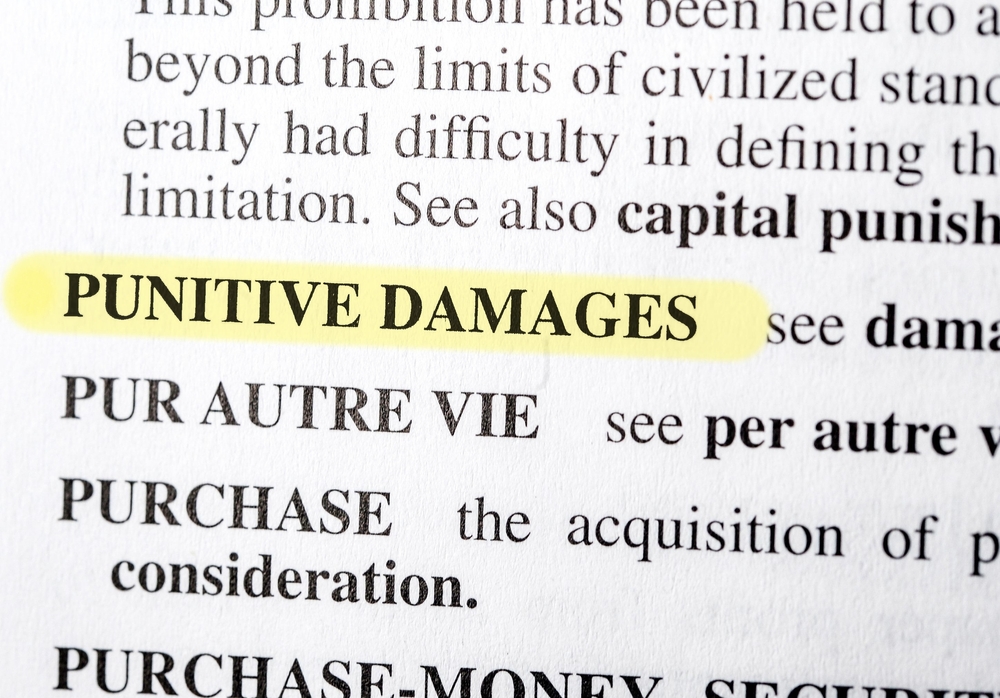It is stressful for any business to learn that it is being sued by a third party. Even scarier is the prospect of punitive damages, which are awarded in certain lawsuits on top of compensatory damages and can stretch into the millions of dollars. What makes punitive damages even more problematic for businesses is that, in many cases, they are not covered by insurance.
What are punitive damages?
Unlike compensatory damages, which are awarded to plaintiffs to compensate them for their losses, punitive damages are private fines that civil juries impose to punish defendants for reprehensible conduct and to deter future intentional wrongdoing.1 As punitive damages are not directly tied to the costs associated with an injury, there traditionally has not been an objective standard for determining the award amount. Tort reform laws in many states have capped how large punitive damage awards can be, and many states with caps have imposed a requirement that punitive damages correspond in some way to the compensatory damages. Juries also generally consider the defendant’s net worth in determining punitive damages amounts.2
When are punitive damages awarded?
Punitive damages are generally only available when a defendant has been held liable for malicious, fraudulent, willful or wanton conduct.3 Different jurisdictions have different bars for the awarding of punitive damages, but courts generally agree that “mere” or ordinary” negligence is not enough to trigger these awards. In New York, punitive damages are only available for “tortious acts which involve ingredients of malice, fraud, oppression, insult, wanton or reckless disregard of the plaintiff’s rights, or other circumstances of aggravation.”4 Further, punitive damages are generally off the table for breach of contract cases in New York unless the case involves conduct that adversely affects the public interest.5
Are punitive damages covered by liability insurance?
Whether your business has coverage for punitive damages depends on two factors: the language in your insurance policy and the public policy of the state governing the dispute. Many policies simply say that they cover “damages” and do not specifically exclude punitive damages. Most courts have held that an insurance policy that provides coverage for “damages” includes coverage for punitive damages, unless the policy’s wording explicitly excludes them. Some policies state that punitive damages are covered in jurisdictions where it is legal for the insurer to indemnify the policyholder for a punitive damage award. Other policies specifically state that they exclude punitive damages.
Debate over whether punitive damages should be insured
From a public policy standpoint, there are arguments on both sides as to whether punitive damages should be insurable. Proponents of allowing insurance for punitive damages point to the sanctity of private contracts: The insurer elected to cover punitive damages and collected a certain premium amount for that coverage from the insured. Unless the policy unambiguously excludes coverage for punitive damages, the policy should be construed in favor of the policyholder, proponents say. Those who favor insurability also cite the potential harm that could result from the bankruptcies of businesses that are denied insurance. They also argue that the absence of insurance coverage does not realistically serve as a deterrent for bad behavior.
Those who oppose allowing the insurability of punitive damages argue that permitting defendants to shift responsibility to the insurer undermines the purpose of the punitive award, which is to punish the wrongdoer and deter others from similar wrongdoing in order to enhance public safety. Opponents point out that when punitive awards are borne by the insurer, they are passed along to the insurance-buying public in the form of higher premiums. As a New Jersey court stated, “The policy considerations in a state where … punitive damages are awarded for punishment and deterrence, would seem to require that damages rest ultimately as well as nominally on the party actually responsible for the wrong. If that person were permitted to shift the burden to any insurance company, punitive damages would serve no useful purpose.…[T]he burden would ultimately come to rest not on the insurance companies but on the public, since the added liability to the insurance companies would be passed along to the premium payers.”6
If you have questions about your business insurance policy or the punitive damages policy in your state, or if you are involved in a dispute with your insurance company, contact Schwartz Conroy & Hack. We have the expertise, experience and tenacity to make sure insurance companies keep their promises to you and your business.
1 IInternational Bhd. of Elec. Workers v. Foust, 442 U.S. 42, 48 (1979) (quoting Gertz v. Robert Welch, Inc., 418 U.S. 323, 350 (1974)).
2 Sears v. Summit, Inc., 616 P.2d 765, 772 (Wyo. 1980)
3 Park Terrace, LLC v. Transportation Ins. Co., 338 Wis. 2d 484, 808 N.W.2d 741 (Wis. Ct. App. 2011)
4 Le Mistral, Inc. v. Columbia Broadcasting Sys., 61 A.D.2d 491, 494, 402 N.Y.S.2d 815, 817 (1st Dep’t 1978)
5 New York Univ. v. Continental Ins. Co., 87 N.Y.2d 308, 315-16, 662 N.E.2d 763, 767-68, 639 N.Y.S.2d 283, 287-88 (1995)
6 Variety Farms, Inc. v. New Jersey Mfrs. Ins. Co., 172 N.J. Super. 10, 410 A.2d 696 (App. Div. 1980)

